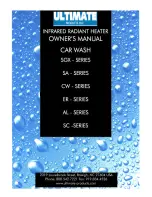
www.sureheat.com
200040-01A
16
INSTALLATION
CHECKING GAS CONNECTIONS
WARNING: Test all gas piping
and connections for leaks after
installing or servicing. Correct
all leaks at once.
WARNING: Never use an
open flame to check for a leak.
Apply a mixture of liquid soap
and water to all joints. If bubbles
form, there is a leak. Correct all
leaks at once.
Pressure Testing Gas Supply Piping System
Test Pressures In Excess Of 1/2 PSIG (3.5 kPa)
1. Disconnect heater with its appliance main
gas valve (control valve) and equipment
shutoff valve from gas supply piping sys-
tem. Pressures in excess of 1/2 PSIG will
damage heater regulator.
2. Cap off open end of gas pipe where equip-
ment shutoff valve was connected.
3. Pressurize supply piping system by either
opening propane/LP supply tank valve
for propane/LP gas or opening main gas
valve located on or near gas meter for
natural gas or using compressed air.
Figure 14 - Gas Connection
* Purchase the optional CSA design-certified equipment
shutoff valve from your dealer.
Apply pipe joint sealant lightly to male threads.
This will prevent excess sealant from going
into pipe. Excess sealant in pipe could result
in clogged heater valves.
For propane/LP gas, the installer must supply
an external regulator. The external regulator
will reduce incoming gas pressure. You must
reduce incoming gas pressure to between 11"
and 14" of water. If you do not reduce incom-
ing gas pressure, heater regulator damage
could occur. Install external regulator with
Figure 15 - External Regulator
with Vent Pointing Down
External
Regulator with
Vent Pointing
Down
Propane/LP
Supply Tank
Equipment
Shutoff Valve
Ground
Joint Union
3/8" NPT
Pipe Nipple
Tee Joint
Reducer
Bushing to
1/8" NPT
1/8" NPT
Plug Tap
Test Gauge
Connection*
Sediment
Trap
Tee Joint
Pipe Nipple
Gap
3" Minimum
the vent pointing down as shown in Figure
15. Pointing the vent down protects it from
freezing rain or sleet.
Install sediment trap in supply line as shown
in Figure 14. Place sediment trap where it is
within reach for cleaning. Place sediment trap
where trapped matter is not likely to freeze.
A sediment trap traps moisture and contami-
nants. This keeps them from going into heater
controls. If sediment trap is not installed or is
installed wrong, heater may not run properly.
Natural Gas
From Gas
Meter (4" W.C.
to 10.5" W.C.
Pressure)
Propane/LP
From External
Regulator (11" W.C.
to 14" W.C. Pressure)
















































